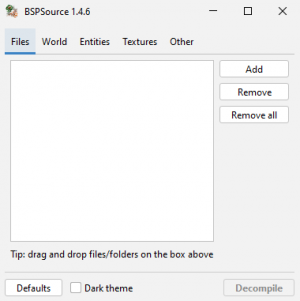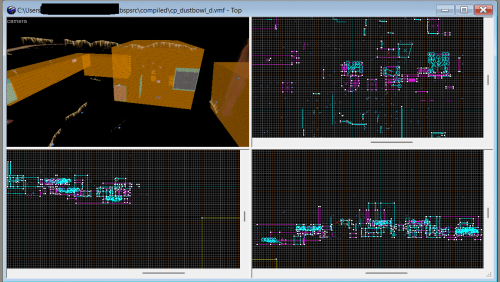Building Respawn Room
Warning: Display title "Building Respawn Room" overrides earlier display title "Building Respawn Rooms".
This article explain the way making the map of typical casual game(like dustbowl).
Before that, Let's learn how to view works created by other users on hammer.
Operate BSPSRC
bspsrc is a converter bsp files with vmf that can be modified in hammer.
Download the file in this link that matches your operating system, unzip it, and run bspsrc.bat.
You can input a bsp file via 'add' and convert it to a vmf file via 'decompile'.
Open In Hammer editor
non-ASCII characters (e.g. Korean, Japanese, Chinese) in the map file path, Hammer++ will crash. If you have already opened a file in a path that contains non-ASCII characters, you can check the broken font by checking recentfile in bin/x64/hammerplusplus/hammerplusplus_settings.ini. Delete those elements and run hammer++ again.In this article, we’re going to get some idea the spawn room and regenerating supply. Let's start by opening the vmf file in Hammer.
Visgroups
The VisGroup feature allows mappers to inspect and edit maps more easily by hiding unnecessary elements.
It lets you group objects together and toggle their visibility in the viewport for better control and organization.
 For analyzing a map, it’s recommended to enable only Point Entities, Brush Entities, and Game Logic in the VisGroup panel.
For analyzing a map, it’s recommended to enable only Point Entities, Brush Entities, and Game Logic in the VisGroup panel.
'show' button in visgroup panel toggles the effect of temporarily checking all elements. Pressing 'show' again will cause only the originally checked elements to appear in the viewport.
Use VisGroups to help identify and isolate objects in a complex map.
Find Entities
Respawn Room
Regenerate Supply


